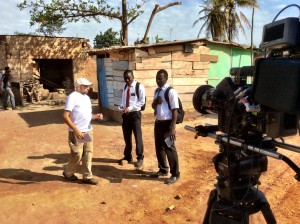Director and producer of “The Saratov Approach” Garrett Batty teams with the producer of the “Saints and Soldiers” movies in the new movie, “Freetown,” which follows a group of LDS missionaries’ quest for survival in Liberia during the Liberian Civil War. The religious thriller, a unique LDS film, comes to theaters April 8, 2015.

The story’s beginnings
“Freetown” is based on the true story of the first Liberian LDS missionaries during the First Liberian Civil War in 1990. The group had to flee the country to survive.
Batty came up with the idea for the movie when he was looking through old missionary stories in the LDS Church archives and saw notes on the missionaries’ experiences.
“There was just a little story on it, and it was intriguing to me,” Batty said.
Batty said he wanted to do another movie that expands on missionaries in extraordinary settings after “The Saratov Approach” was well received.
A unique LDS thriller
Melissa Leilani Larson, the movie’s screenwriter, said the movie is a thriller. “It’s a harrowing story,” she said. “We wanted to tell a story that was atypical — about missionaries in a scary situation. Will they survive? What will they do? It’s got lots of suspense.”
A five-person American crew shot the entire film in Ghana in six weeks. Batty said they shot the movie in villages where there’d never been a movie camera before.
He said they’re the first Utah-produced independent film to film entirely in West Africa. “I think we were able to build cultural bridges while making the film,” Batty said.
This cultural communion also extends to Batty’s target audience.
“I think it’s relatable absolutely to BYU students, grown people … anyone who’s ever wanted something and had to fight for it,” Batty said. He said it’s a story not limited to members of the LDS Church alone.
Larson tried to make the film universal by constantly reviewing drafts of the script as she pretended she wasn’t LDS. “The trick in drama in general is to strike a balance between that shorthand and what other people will understand,” Larson said. “You want to keep what we do but also make it easily accessible.”
Thriller themes and connections
“What drew me to the story was it was a very compelling story about real people in a life-or-death scenario,” Batty said. “As a filmmaker, those types of stories are very cinematic.”
Although neither one of those stories are common missionary experiences, Batty said they’re cinematic because perilous situations bring up themes all audiences can relate to.
“There are two main emotions we all feel when we see a story,” Batty said. “It’s hope and fear. It doesn’t matter to me that they’re missionaries and members of the Church. It matters to me that they encounter hope and fear.”
Larson said writing a thriller is challenging for her because she normally writes roles for women, but giving characters personalities and choices makes it fun for her.
She got to know each character to decide what she’d have them do. “You want to find what makes each character tick, and you want to be true to them,” she said. “People relate to characters.”
Batty’s direction for the movie was to make it as authentic as possible. “When you see the movie on screen you really get this feeling of African culture and African landscapes and, more importantly, the African people,” he said. “It really makes for a beautiful experience.”
An authentic cast
The all-African cast helped Batty provide the authenticity he hopes the movie will have.
“There were members of the cast that had lived through this civil war that we were trying to recreate,” Batty said. “They had their own experiences to draw from. That made it all the more palatable when we were recording.”
The costume designer knew exactly what the rebels wore because she saw them and experienced the war.
Batty said he and his crew often felt they were living in the movie during filming. They learned principles from the characters’ obstacles that helped them overcome obstacles in filming.
“If (the missionaries) kept moving forward they learned there would be daily miracles that would accompany those obstacles,” Batty said. “Whatever daily disaster came up in filming, if we kept moving forward, there would be a miracle accompanying that.”
Out of 125 native West Africans who auditioned, Batty and others on his team unknowingly cast three members of the Church, two of whom had served missions. Batty put one of these members in each of the three companionships the movie follows.
“We knew what we needed to get, and we knew the Lord knew what we needed and what we were willing to get, and He certainly provided a way for us to do that,” Batty said.
Hopes for the story
Batty said as the director he has a lot of responsibility for what is seen on the screen, but the filmmaking is a collaborative process. He said the cinematographer is incredible, the producer is experienced (Adam Abel produced “Saints and Soldiers” and “Forever Strong,” among other movies), the writer is talented, and the actors caught the vision early on.
Kent Thalman, a BYU junior studying media arts, said he was excited to see “Freetown” when he saw the trailer before watching “Meet the Mormons.” He said the shots in the film’s trailer made the visuals and acting look good.
“From what I could tell it looked like the actors did a good job from their emotional cues on screen,” Thalman said. He said the shots in the trailer gave the film a continuous look.
Batty said the film has come together nicely. “I think the success hopefully will be that we portrayed this story in a matter that appeals to a lot of people and gives proper recognition to what these missionaries experienced,” Batty said.
“Freetown” comes to theaters on April 8, 2015.




